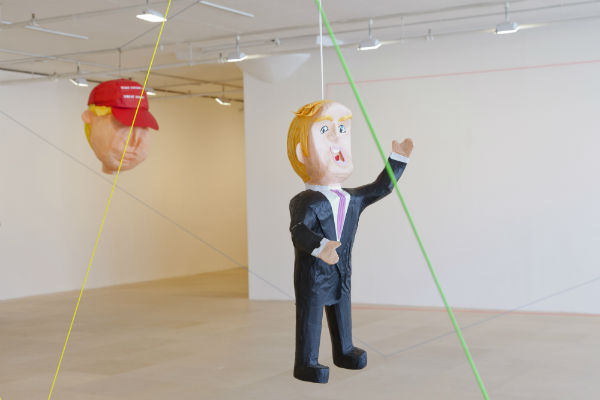
America has quite the situation on its hands in the rise of one Donald J. Trump. Now, artist Rachel Harrison has mashed together the image of the real estate magnate and presidential contender, along with those of Al Pacino and Amy Winehouse, and an actual bullet hole, for what she’s calling her own “situation” (as opposed to “show” or “exhibition”), on view now at Greene Naftali, her New York gallery.
Unlike Trump’s presidential run, which has been the subject of wall-to-wall coverage since its launch, Harrison’s show (I’m just going to call it a show) opened unannounced, with no ad campaign or even a press release. In it, Harrison evokes the dangers of the reality television star’s rise via a reference to another, little-known recent tragedy.
In November 2015, some of Harrison’s trademark pieces were included in “After Picasso: 80 Contemporary Artists,” an exhibition at the Wexner Center for the Arts, in Columbus, Ohio. That show closed shortly following its opening after Dean Sturgis, a disgruntled former Wexner security guard, showed up one morning, brandishing a gun and taking hostages.
Over just a few minutes, Sturgis vandalized artworks with spray paint and even shot several of them before committing suicide. He had resigned some six years previously, before he was to be fired in the wake of confrontations with supervisors and co-workers, according to the Columbus Dispatch.
Three Harrison works now on display at Greene Naftali were among the wounded.
Rachel Harrison, Valid Like Salad, detail, 2012. Photo courtesy the artist and Greene Naftali, New York.
Her sculpture Valid Like Salad (2012) incorporates a framed drawing of Al Pacino, hanging on the flank of a large, abstract sculpture painted in shades of gray. Pacino’s head took a bullet, just above the eye, during the rampage at the Wexner. Sturgis also defaced one of Harrison’s drawings of the musician Amy Winehouse with a swipe of black paint; another also took a bullet. Four drawings of the pop star, including the vandalized ones, hang on a wall facing Pacino at Greene Naftali.
Rachel Harrison, More News: A Situation, 2016. Photo courtesy the artist and Greene Naftali, New York.
Visitors see this trove of damaged works, ensconced in a small back room, only after passing through the gallery’s main space, which Harrison has transformed into a wonderland of Donald Trump piñatas. She obtained many of them from Los Angeles manufacturers, who were flooded with orders after Trump branded Mexicans rapists and drug dealers while announcing his presidential run; some come from Mexico.
One piñata is just a huge head, dangling from the ceiling, sporting the unmistakable red “Make America Great Again” baseball hat. Another is displayed in the cardboard box in which it was delivered, mostly submerged in Styrofoam peanuts; a plastic bag is chillingly over its head, as if to smother its subject. Yet another stands in a corner, its bottom half wrapped in sheets of packing foam like a white skirt worn over the business suit.
Rachel Harrison, More News: A Situation, 2016. Photo courtesy the artist and Greene Naftali, New York.
All these effigies appear alongside references to Marcel Duchamp and Fred Sandback. Geometric sculptures made of colored yarn, à la Sandback, stretch between walls, ceiling, and floor. Tangled up in that string near the entrance is one extra-large bottle-drying rack, one of the mass-produced items Duchamp employed to introduce the found object, a major inspiration for Harrison’s practice, into the artistic lexicon.
The show thus presents the unlikely spectacle of the most willfully ignorant political candidate imaginable paired with two of the most cerebral artists of the 20th century. They’re all brought together, moreover, by one of the brainiest artists working today, who has appeared in major exhibitions from the Whitney Biennial to the Venice Biennale, and is even the subject of another current exhibition, at New York’s Museum of Modern Art.
While this particular three-way marriage might seem improbable, Harrison has consistently brought together art history’s greats with pop icons, seemingly as much to deflate the mighty as to indicate the mythical status of modern celebrities. The drawing that Sturgis vandalized at the Wexner, for example, already juxtaposed a Picassoid rendering of Winehouse with an image of Duchamp’s 1954 sculpture Wedge of Chastity. She also combined Sandback-style string and a Trump piñata in a previous work, the punning sculpture The Sandbag.
Rachel Harrison, More News: A Situation, 2016. Photo courtesy the artist and Greene Naftali, New York.
Piñatas are, of course, made to be destroyed in acts of ritual violence. Real violence has routinely broken out at Trump campaign events, inspired by just the kind of heartland rage that presumably, along with whatever madness, drove the show’s animating ghost, Dean Sturgis, to terrorize—of all places—a cultural institution.
Not only violence, but death, too, stalks this show once you dig into its symbols. Sandback committed suicide in 2003; Winehouse died from a drug overdose in 2011.
Rachel Harrison, More News: A Situation, 2016. Photo courtesy the artist and Greene Naftali, New York
Nor is it only individual tragedy that is at stake in America today. No less a commentator than the New Yorker’s Adam Gopnik (to choose just one example), in his recent column “The Dangerous Acceptance of Donald Trump,” wrote darkly, “If Trump came to power, there is a decent chance that the American experiment would be over.”
But even if the America of our ideals doesn’t expire, Harrison’s juxtapositions suggest, it may merely limp on, having sustained a bullet wound to the eye.
Rachel Harrison’s “situation” is at Greene Naftali Gallery, New York, through June 18. “Rachel Harrison: Perth Amboy” is at the Museum of Modern Art, New York, through September 5.